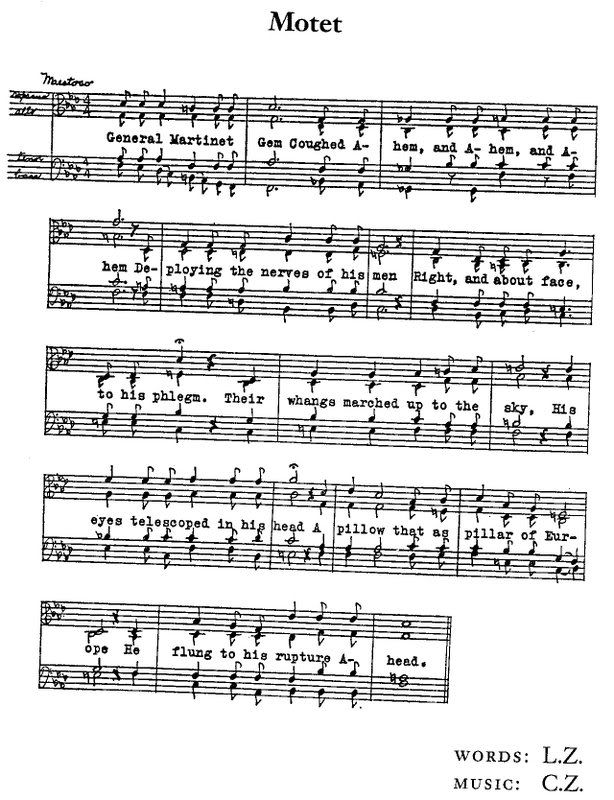Reading through the poetry of Louis Zukofsky can, at times, be a daunting task, especially if one is not familiar with his writing. Such preconceptions are only exacerbated by the tendency of traditionalists, “at least since [Modernism,] to complain that contemporary poetry has become difficult, and that this difficulty has alienated readers who used to flock to poetry” (Shepherd 8). But, it would seem the only “problem of meaning” is that there isn’t a problem at all, and difficulty arises within certain works of poetry when the reader chooses to enter the work on their own terms and not on the terms of the poem itself. The “problem of meaning,” with regard to “difficult” poetry, is actually the reader’s “problem of critical rigidity”; or, to phrase the problem less judiciously, the reader’s lack of critical engagement.
Yet, the “difficulty” one encounters when reading Zukofsky’s poetry no doubt aides in the mainstream neglect of his corpus; but, such richness of language and density of thought can also account for the reverence and attention several generations-worth of notable poets have accorded his work[8]. If Zukofsky’s poetry is to enter into a broader conversation, it will only be if/when those that approach his writing move away from the signifying regime that seeks to interpret and toward a mode of reading that brings “forth continuous intensities” and allows for the reader to be “subject to [the poem’s] energy”: to understand each poem as a ZwO, wherein we experiment with the possibilities they offer. By releasing the Self and the quest for “meaning,” one can submit to the object (in this case the poem), reveling in the affective experience. Of course, there is no one way to create a ZwO, or a BwO in general. The construction necessitates experimenting with different strata and discovering relational links between them. While section sixteen of “29 Songs” operates in interesting and exciting ways, both sonically and linguistically, by conceptualizing it through the lens of becoming-cricket, deterritorialization of the refrain, and the affective and intensive possibilities of the stutter, different ZwOs will necessitate a different network of relations to produce flow conjunctions and continuums. Take, for instance, Zukofsky’s final collection 80 Flowers. How can one enter a poem such as “X”:
Of thousand grown climb head-on-head
A “X” unknown stand indued
no glue kiss’d peon knee
freesia’s iris grass-tropical true scourge
bees earthflight magnetic north 4-native
dial-canter excellence scent one-thousandth-in
one-night lady’s-eardrops-fuchsia seaborne northeast unnailed
papyrus-bath-nut trailing arbutus fringed-gentian hydrangea (Zukofsky, Short Poems 351)
“X,” like the other eighty poems of the collection (the untitled, introductory poem pushes the collection’s total from eighty to eighty-one pieces), contains eight lines, each consisting of five words. But throughout the manuscript, Zukofsky implements liberal use of the n-dash to create a root system that extends each line, overloads the concept, and creates a veritable rhizomatic structure. Is this an instance of becoming-flower, a line of flight fleeing into a new zone of deterritorialization, a linguistic stutter that minorizes language? Likewise, what can one make of the collaborative efforts between Louis and his wife, Celia? Take, for instance, the poem “Motet” (Click image for bigness):


Can this be seen as a moment of a ZwO through becoming-music, becoming-violin? What of the fact that this piece is a collaborative effort? How does this alter our reading of the work? Can this piece even be properly read without musical accompaniment? Is it another instance of seeing with the ear and singing with the eye, redistributing sensory perception in an effort to produce a unique affective response? The answers, it would seem, are to be found in the detail of the object itself and can only be unlocked when we, as readers, are subject to its energy. Or, as Zukofsky writes in section twenty-seven of “29 Songs”:
“there
develops
a
multiplicity
“of
social
relations
“that are
spontaneous in
their
growth
“and are
quite
outside
“the
control of
the
actors” (Zukofsky, Short Poems 60)
To acknowledge that “actors” do not control the “a multiplicity of social relations” is for the reader to submit to the poem-object and recognize that the subject does not transcend or dictate its material conditions; instead, the subject and object function concomitantly within those conditions and are “spontaneous in their growth,” in that their development is tied to a unique social, linguistic, and historical context. Perhaps, then, to read Zukofsky properly, one must understand that we are no longer “ourselves”: we are multiplicities operating on a stratum “outside” the subject, wherein the mind and the poem-object flow together in meticulous relation to one another to produce a continuum of thought in detail.
No comments:
Post a Comment